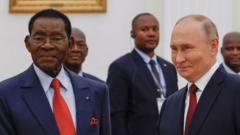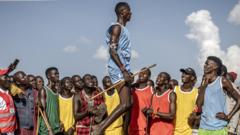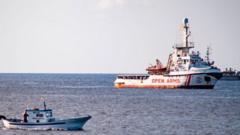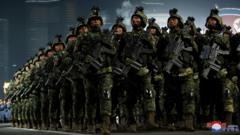In a significant move to bolster its influence in Africa, Russia has deployed up to 200 troops to Equatorial Guinea. This development is framed within the context of Equatorial Guinea seeking military alliances and resources while facing criticism over its human rights record.
Russia Expands Military Influence in Equatorial Guinea with Troop Deployment

Russia Expands Military Influence in Equatorial Guinea with Troop Deployment
Reports reveal that Russia has sent military instructors to Equatorial Guinea, intensifying its military presence in Africa while raising concerns about geopolitical impacts.
Reports indicate that Russia has dispatched between 100 to 200 military instructors to Equatorial Guinea, aiming to enhance the country’s presidential security. The instructors are reportedly training elite guards in the capital city, Malabo, and in Bata, aiming to fortify the regime of President Teodoro Obiang Nguema Mbasogo, who has been in power since 1979. These troop deployments came to light following a meeting between the Russian president and the Equatorial Guinean president in September.
This latest military presence marks a continuation of Russia's strategy to expand its influence across the African continent. In recent years, Russia has increased its military footprint in West and Central Africa, often utilizing mercenaries to strengthen alliances with military regimes and aid in combating insurgent activities. The troops sent to Equatorial Guinea are reportedly linked to a rebranded paramilitary group known as Corps Africa, which was formerly operated as Wagner Group.
The geopolitical implications of this military engagement are notable. Tutu Alicante, a US-based human rights activist from Equatorial Guinea, suggested that Russia's presence could challenge US interests in the region, as the US has previously invested in Equatorial Guinea’s energy sector which has seen decreased activity in recent years. As regional dynamics shift, many West African nations with recent coup experiences seek alternative alliances, moving away from their historical ties with Western nations like France, which they accuse of failing to effectively address jihadist threats.
Equatorial Guinea has faced longstanding criticism for its authoritarian governance and poor human rights record, highlighted by allegations of extrajudicial killings and torture. Both President Obiang and his son, Vice-President Teodoro Obiang Mangue, have pursued military and resource agreements with Russia and Belarus, while their administration has previously engaged in similar negotiations with China.
Analysts suggest that the increased military cooperation between Russia and Equatorial Guinea could signify a broader reorientation of foreign relations in Central Africa and beyond, as nations reassess their global alliances in light of changing security landscapes and regional conflicts.



















